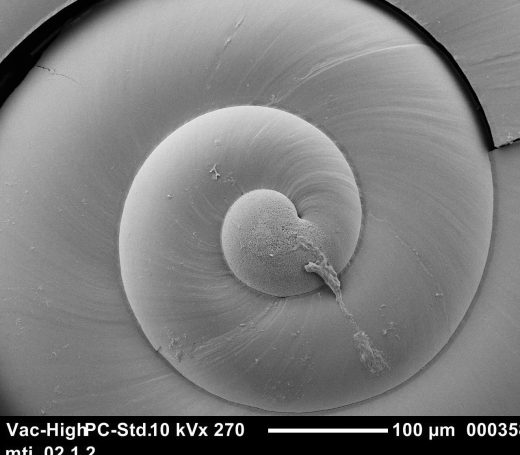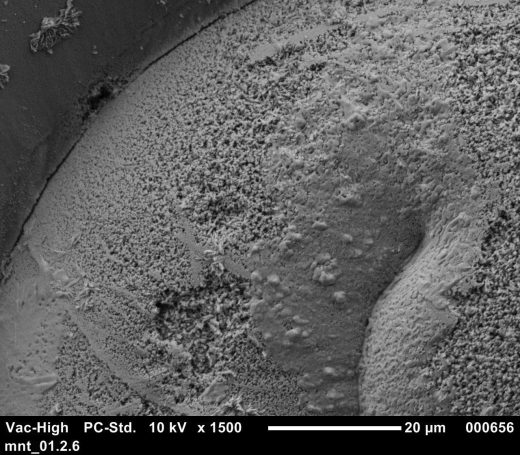Environment & Energy
Related: About this forumIt's Happening Now - Shells Of Tiny Marine Snails, Key To Ocean Food Chain, Are Already Dissolving
The canaries foretelling ocean acidification fly through the water on winglike feet, lofting their tiny curl of a shell behind them. And those shells are dissolving. For more than a decade, laboratory studies and models have warned of the vulnerability of pteropods—tiny sea snails also known as sea butterflies—to ocean acidification. Now those predictions have escaped the lab. From the Gulf of Alaska and the Bering Sea to the Beaufort Sea, scientists are finding pteropods with dissolved shells. Nina Bednarsek, a biogeochemist with the Southern California Coastal Water Research Project, recently presented some of these findings at the Alaska Marine Science Symposium.
Bednarsek’s latest field observations show dissolving pteropod shells from a yawning hotspot of corrosive water that encompasses their spawning grounds in the western Gulf of Alaska. In the Canadian Beaufort Sea, the picture is even more troubling. There, in fjords where ocean acidification is exacerbated by glacial meltwater, up to 70 percent of the animals have corroded shells.
Since the Industrial Revolution, 40 percent of the carbon dioxide released from the burning of fossil fuels has been absorbed by the oceans. The excess carbon dioxide makes the water more acidic, causing calcium carbonate (the compound used by many organisms to build shells or other structures) to dissolve more easily. Since pteropods build thin shells from the most soluble form of calcium carbonate, they’ve long been studied in ocean acidification research. In laboratory experiments, researchers bubble carbon dioxide into vials containing the tiny creatures. They track how the shells degrade, and even crumble, in the most extreme treatments.
Hundreds of meters down, the whole ocean is corrosive to these delicate sea snails. The region of pteropod-friendly water near the surface is shallower in cold water, which can absorb more carbon dioxide, and in places like the northern Pacific Ocean, where circulation brings naturally more acidic water closer to the surface. Seasonal patterns of currents and upwelling have always brought some of this water within the range of pteropods, but the rapid increase in anthropogenic carbon dioxide is expanding the sea snails’ exposure to harmful conditions.


Scanning electron microscope examinations of pteropod shells show how the calcium carbonate dissolves in acidified water. In the first image, a healthy shell is smooth and full, while in the second, a closer zoom on a shell that had been exposed to acidified water shows it to be rough and pockmarked. Images by Nina Bednarsek
EDIT
https://www.hakaimagazine.com/news/the-shells-of-wild-sea-butterflies-are-already-dissolving/
democratisphere
(17,235 posts)femmedem
(8,203 posts)Last edited Mon Mar 4, 2019, 09:09 AM - Edit history (1)
K&R. Thanks for posting.
MuseRider
(34,111 posts)here rallying for solar in a state that makes you pay more if you give back energy to the company seem rather stupid.
The fact that we have known about all of this for so very long and done essentially nothing makes me crazy. I read your posts but rarely reply. What on earth is there to say? People want stuff and people have been given the stuff and still they want more knowing their later generations will suffer terribly for their greed and still we want more stuff.
Mickju
(1,803 posts)I remember hearing that this was going to happen at least 10 years ago, and now here we are. I don't see how this will be fixed before catastrophe strikes.
lindysalsagal
(20,692 posts)In other words, imho, until and unless humans evolve away from our tribal capitalism, we will threaten our own existence.
As long as humans believe in God instead of science, we'll adhere to our zero-sum sibling rivalry over resources.
Because religion promises false hope in God's salvation, we close our eyes and pray for help from something that has never existed.
Because people believe life is only a testing ground for the afterlife, we hold our planet in contempt.
Our short sighted craving for immediate emotional and physical gratification prevents us from facing our responsibilities to the eco system and each other.
We. Don't. Listen. Because we're too selfish and lazy.
hunter
(38,317 posts)We're soon to be evicted. It won't be pretty.
The meek shall inherit the earth for no other reason that there are so many. Billions of meek.
The ex-powerful will die in their fortified bunkers.
Humanity has two choices: A soft crash landing or a hard one.
Most of the passengers survive, or there's nothing left of of us but a queer layer of trash in the geologic record.